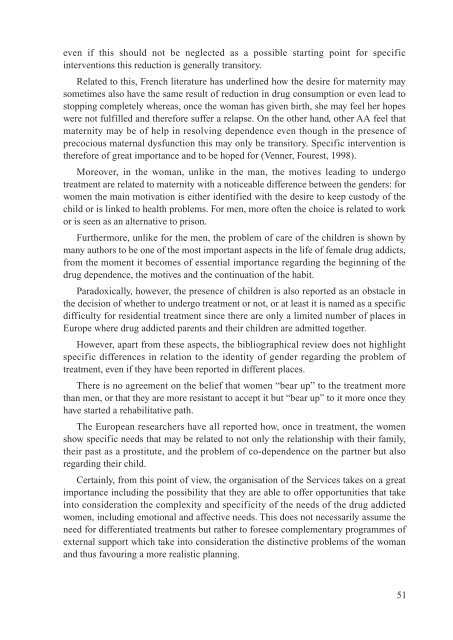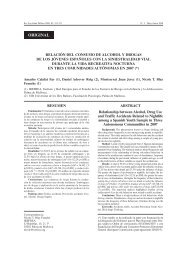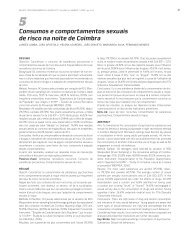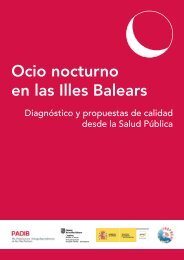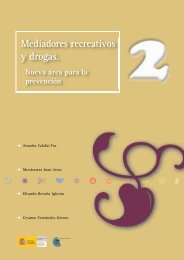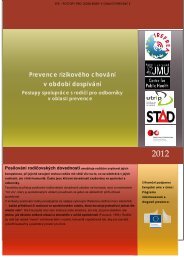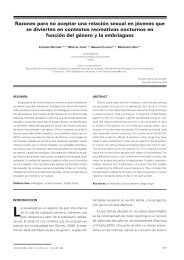Women drug abuse in Europe : Gender identity - Irefrea
Women drug abuse in Europe : Gender identity - Irefrea
Women drug abuse in Europe : Gender identity - Irefrea
Create successful ePaper yourself
Turn your PDF publications into a flip-book with our unique Google optimized e-Paper software.
even if this should not be neglected as a possible start<strong>in</strong>g po<strong>in</strong>t for specific<strong>in</strong>terventions this reduction is generally transitory.Related to this, French literature has underl<strong>in</strong>ed how the desire for maternity maysometimes also have the same result of reduction <strong>in</strong> <strong>drug</strong> consumption or even lead tostopp<strong>in</strong>g completely whereas, once the woman has given birth, she may feel her hopeswere not fulfilled and therefore suffer a relapse. On the other hand, other AA feel thatmaternity may be of help <strong>in</strong> resolv<strong>in</strong>g dependence even though <strong>in</strong> the presence ofprecocious maternal dysfunction this may only be transitory. Specific <strong>in</strong>tervention istherefore of great importance and to be hoped for (Venner, Fourest, 1998).Moreover, <strong>in</strong> the woman, unlike <strong>in</strong> the man, the motives lead<strong>in</strong>g to undergotreatment are related to maternity with a noticeable difference between the genders: forwomen the ma<strong>in</strong> motivation is either identified with the desire to keep custody of thechild or is l<strong>in</strong>ked to health problems. For men, more often the choice is related to workor is seen as an alternative to prison.Furthermore, unlike for the men, the problem of care of the children is shown bymany authors to be one of the most important aspects <strong>in</strong> the life of female <strong>drug</strong> addicts,from the moment it becomes of essential importance regard<strong>in</strong>g the beg<strong>in</strong>n<strong>in</strong>g of the<strong>drug</strong> dependence, the motives and the cont<strong>in</strong>uation of the habit.Paradoxically, however, the presence of children is also reported as an obstacle <strong>in</strong>the decision of whether to undergo treatment or not, or at least it is named as a specificdifficulty for residential treatment s<strong>in</strong>ce there are only a limited number of places <strong>in</strong><strong>Europe</strong> where <strong>drug</strong> addicted parents and their children are admitted together.However, apart from these aspects, the bibliographical review does not highlightspecific differences <strong>in</strong> relation to the <strong>identity</strong> of gender regard<strong>in</strong>g the problem oftreatment, even if they have been reported <strong>in</strong> different places.There is no agreement on the belief that women “bear up” to the treatment morethan men, or that they are more resistant to accept it but “bear up” to it more once theyhave started a rehabilitative path.The <strong>Europe</strong>an researchers have all reported how, once <strong>in</strong> treatment, the womenshow specific needs that may be related to not only the relationship with their family,their past as a prostitute, and the problem of co-dependence on the partner but alsoregard<strong>in</strong>g their child.Certa<strong>in</strong>ly, from this po<strong>in</strong>t of view, the organisation of the Services takes on a greatimportance <strong>in</strong>clud<strong>in</strong>g the possibility that they are able to offer opportunities that take<strong>in</strong>to consideration the complexity and specificity of the needs of the <strong>drug</strong> addictedwomen, <strong>in</strong>clud<strong>in</strong>g emotional and affective needs. This does not necessarily assume theneed for differentiated treatments but rather to foresee complementary programmes ofexternal support which take <strong>in</strong>to consideration the dist<strong>in</strong>ctive problems of the womanand thus favour<strong>in</strong>g a more realistic plann<strong>in</strong>g.51


